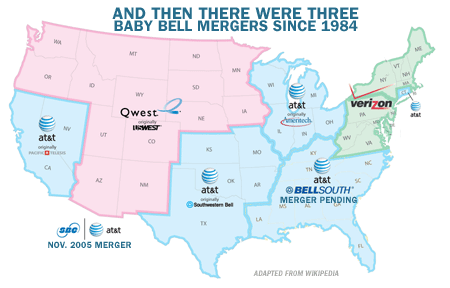
The Telcos

The Ma Bell monopoly was split up by anti-trust legislation in 1984 resulting in seven regional or 'baby' bells. Through mergers and buy-outs only three of these companies will remain (pending the AT&T - Bell South merger announced recently). The three survivors are AT&T, Verizon and Qwest. Today they are much stronger than before and combined they control virtually the entire country.

AT&T
AT&T the long distance provider merged with SBC, one of the largest Baby Bells, in 2005. With it's impending acquisition of Bell South, AT&T is on the verge of controlling most of the desirable urban markets in the country. SBC previously gobbled up Pacific Telesis, Southwestern Bell, Ameritech and SNET. The AT&T strategy has been heavyhanded to say the least. In some areas, they are leaning heavily on state legislatures to get state franchises while funding astroturf campaigns to shape public opinion. In other areas they are 'reaching out' and suing small municiplaities, either to get the deals they want or to set examples for other cities in their path (image a 50 billion dollar corporation bearing down a small municipality of 50,000). On the federal level they are a major campaign contributor along with Verizon.
Verizon
Though serving a smaller geographic region than AT&T, Verizon controls the riches of the Northeastern cities and surburban sprawl. Verizon previously gobbled up NYNEX and Bell Atlantic to expand their reach. They too have been pushing heavily for state and national franchising and are also guilty of some of the dirtiest astroturf campaigning.
Qwest
Qwest, originally US West, services largely rural states in the southwest and north west and has the smallest subscriber base of the three Telcos. Qwest has been the quietest, probably because it faces far more difficult infrastructure challenges than AT&T and Verizon who could more quickly capture the richer surburban and urban markets. Nontheless, Qwest will stand to gain like the others from COPE.